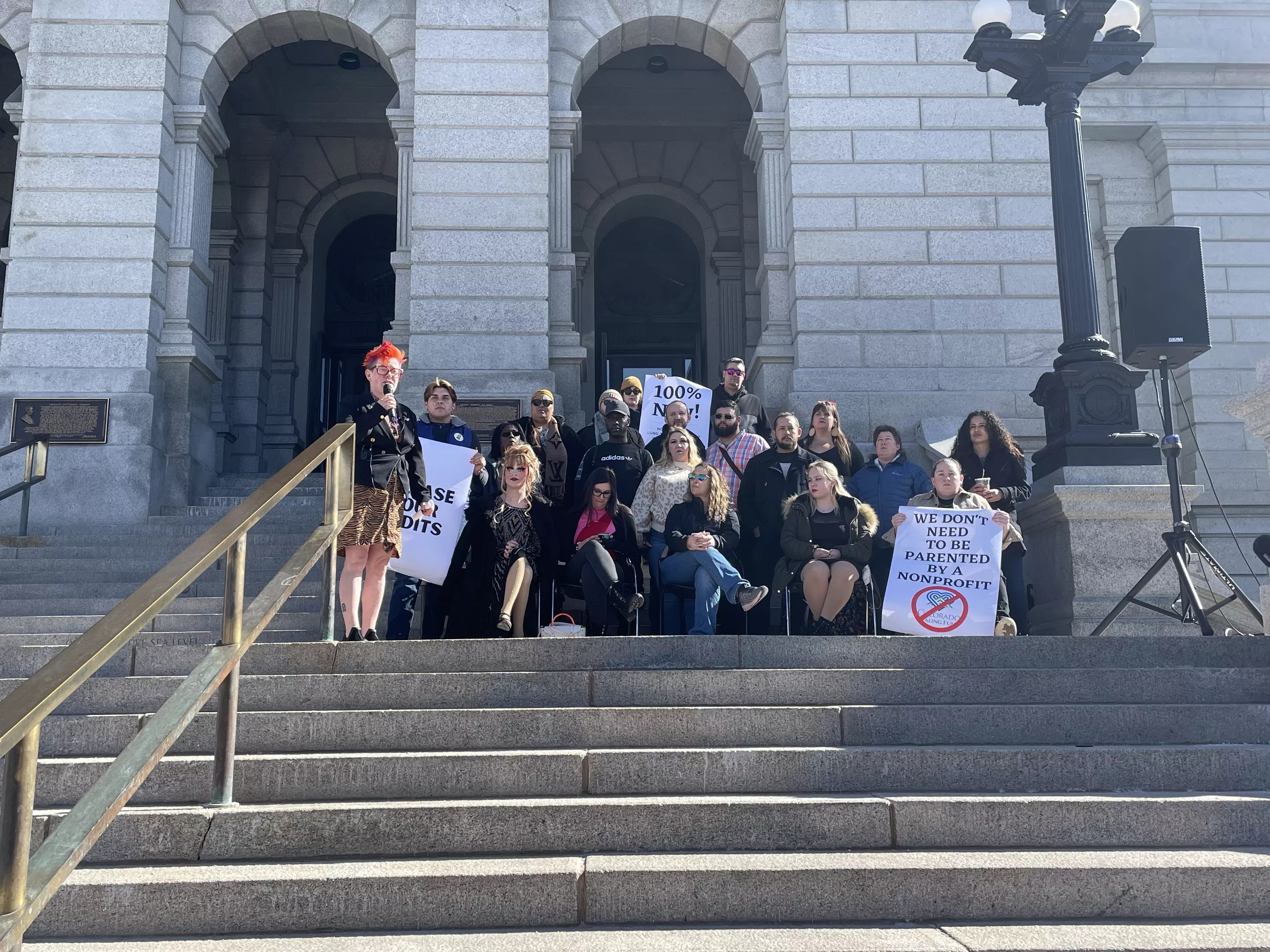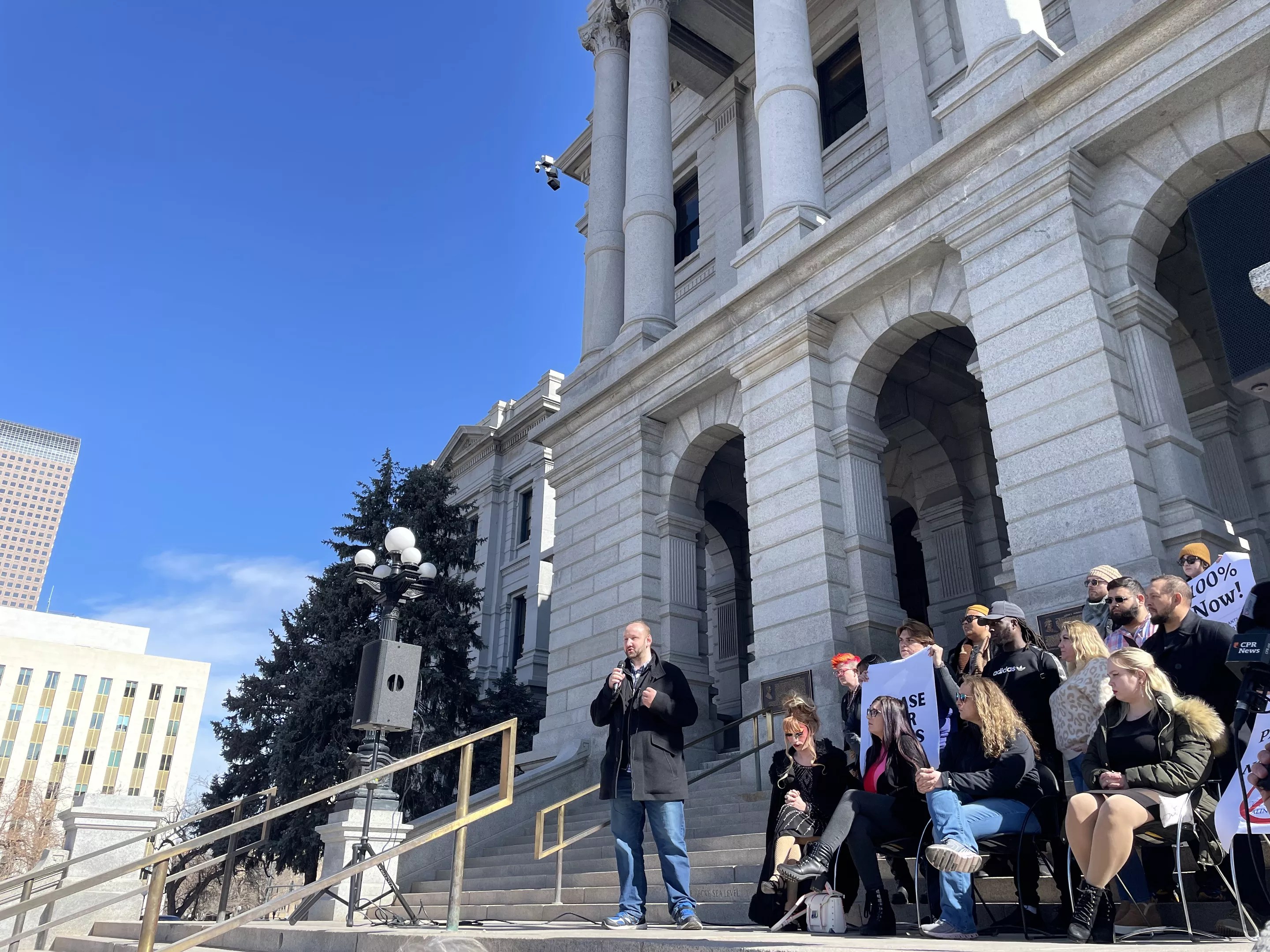
Catie Cheshire

Audio By Carbonatix
The depth of care among the survivors of Colorado’s mass shootings was palpable during a press conference on February 14, when they supported each other as they discussed the problems they’ve had receiving funds raised for victims after these traumatic events.
People who were injured, the families of people who were killed, and others who were at Club Q the night of the November 20 shooting say that the Colorado Healing Fund is paternalizing them and not allowing them to access the money collected for them.
“There’s a story that happens after the shooting. There’s this lost, forgotten story that no one knows,” said James Slaugh, who was at the club that night with his partner and sister. “That story is of struggle. That story is of trying to feel normal. That story is of not wanting to look over our shoulder every single day, or every time we go into a club, or anywhere. And unfortunately, none of us have been able to quite meet the needs that we have. We’re all struggling. We’ve had to jump through hoops to just get our rent paid. We’ve had to send out bill after bill and have the money come in late because the Healing Fund is not helping us.”
Slaugh said that CHF hasn’t brought victims into the loop. According to CHF Executive Director Jordan Finegan, that’s because the organization doesn’t conduct on-the-ground response and prefers that victims work with their assigned victim advocates. But these victims want the funds in their hands without the intermediary of victim advocates or any other organization.
“We are adults,” Slaugh said. “We can take care of our own funds. We have our own accountability.”
Victims from as far back as the 2012 Aurora theater shooting joined Slaugh on the stage. Over the past decade, questions have come up repeatedly about how to distribute funds to help people after mass tragedies.
CHF was formed in 2018 by the Colorado Attorney General’s Office when Cynthia Coffman, who is now board chair for CHF, was AG. Using money from custodial funds, her office provided $1 million in seed funding to set up the nonprofit. After a mass tragedy in Colorado, CHF creates a fund to raise money for victims, but victims say that model results in a disconnect between what they need and what they get. Additionally, CHF funnels money through other nonprofits instead of giving it directly to victims; that’s where the accounting, paperwork and denied requests for funds come in.
“We have a fiduciary responsibility to donors and victims alike to ensure that the money is distributed fairly and securely to victims, and we have a moral responsibility to ensure the money goes to those places where it can do the most good,” CHF says on its website.
But these victims say the money would do the most good in their hands.

James Slaugh survived the Club Q shooting, but now he’s fighting to heal.
Catie Cheshire
Ashtin Gamblin was working the door the night of the Club Q shooting and was shot nine times; she’s still recovering. During the process of being treated for her injuries, her wedding rings, which had been passed down by her grandmother, were lost.
“The Colorado Healing Fund told me that I wasn’t allowed to purchase new wedding rings,” she said at the press conference. “I wouldn’t get reimbursement if I purchased something that was going to make me feel a little bit normal because there was something missing from my left hand, and that’s not fair to me. That I can’t have even one thing that makes me feel somewhat normal.”
She spent $700 to get a new gold wedding band, and CHF isn’t reimbursing her.
“We can’t survive on ‘no’ or somebody else’s decisions on what is and isn’t covered,” Gamblin said. “It’s our decision. We know what we need, and we can’t do this. We are asking everybody to please stand with us and support us.”
After the press conference, Tiffany Loving, whose sister Kelly Loving was killed at Club Q, told Westword that she’d requested to fly in from her home in Memphis a few days early and leave a few days late around the time the shooter was scheduled to appear in court.
“I wanted to be with the family members and get to know the victims’ families and stuff, and they tell me that they can’t pay for a vacation,” she says. “How is that a vacation?”
According to Loving, wanting to be connected to others in her situation isn’t a vacation, but a need.
The press conference was organized by Bread and Roses Legal Center, which was founded by community members who helped respond to Denver’s tattoo shop shootings on December 27, 2021. Erika Righter, whose shop was next door to Sol Tribe Tattoo, where Alicia Cardenas and Alyssa Gunn Maldonado were killed, testified that CHF had problems then and still has problems now.

Ashtin Gamblin says now is the time to speak up.
Catie Cheshire
“They were using the names of two murdered Indigenous women to fundraise and implied that people shouldn’t trust the GoFundMe set up by the very people who actually had permission to,” Righter said. “As the ground zero of the resourcing, never once was I contacted by any of them to offer help. I was in crisis. My kids were in crisis, and there were no victims’ advocates who stopped by to see what we needed. …Thankfully, community showed up. We got people fed, protected.”
When tragedy struck at Club Q, Righter and Bread and Roses bought Christmas presents for twelve children whose parents were impacted by the shooting. She said that’s an example of an expense that may not be approved as victims’ assistance, but that families needed.
“The truth is the Healing Fund should divest the remainder of the funds to the victims and walk away,” Righter said. “Colorado victims deserve to have culturally relevant, community-led response to crisis, and leaders need to listen when we shout that something isn’t right.”
CHF isn’t the only one whom the survivors take issue with. Matthew Haynes, one of the owners of Club Q, set up a GoFundMe with this description: “This fund is managed by Club Q directly and will be used to ensure the Club Q staff and entertainers don’t suffer financial hardship due to this horrific act. This fund will also go towards the total remodel of Club Q, the construction of an appropriate memorial for our victims and a small museum onsite.”
At the February 14 event, Hysteria Brooks, a producer and performer at Club Q, said that venue staff and entertainers haven’t received a dime.
“He should take care of his staff and employees first. The club should not rebuild, or reopen, or anything of the sort until he ensures that employees are taken care of,” Brooks said.
The employees are asking that 75 percent of the more than $50,000 raised on Haynes’s GoFundMe go to them. On February 13, Club Q posted on its Facebook page that it is working to reopen by fall 2023 and would distribute funds to “former employees” starting February 17. That post was the first time employees heard that they wouldn’t have jobs to return to, that they were now “former.”

Hysteria Brooks wants Club Q owner Matthew Haynes to put people before his business.
Catie Cheshire
Brooks went to the club the night of the shooting to do triage and help. Just because not every employee was working that night or was injured doesn’t mean their lives weren’t impacted, he pointed out.
“A lot of people in this are victims whether you were there or not,” Brooks told reporters before the event. “The families of the deceased are victims, the people who were in the room are survivors and victims. People who are in our broader community of LGBTQ+ that are now suffering PTSD – they are also victims.”
Brooks noted that it has been months since the shooting and that Club Q employees and performers have been out of work since then, adding that even if they get an equitable amount on February 17, that was three months without support from their employer.
“Through his discussions on distributing funds, he has stated that he’s going to average three months of our salaries and then give us a one-time check based on those averages,” Brooks said during the press conference. “The people that have donated to this official GoFundMe did it out of the kindness of their heart, because they believed that what they were donating to was going to go directly to the people that were affected, and that is not the case. Matthew plans on using the majority of those funds to reopen his business, and, I’m very sorry, but people should come before businesses.”
The employees want a distribution model based on the severity of impact, with someone like Gamblin receiving more than staffers who weren’t there that night, but with everyone receiving something. Haynes told Westword that the fund has always been meant specifically for wages and not other forms of victim support that are handled by CHF or the National Compassion Fund.
The takeaway from those who shared their stories: Only those impacted can know what is best for them. They want the funds collected in their names now, in full, and without strings. And they want an end to CHF and organizations like it.
“I’m going to call out the governor of this state, Jared Polis,” said Amy Cook, who survived the Aurora theater shooting and is fighting in solidarity with new victims. “I’m going to call out the attorney general of this state, Phil Weiser. I’m going to call out every legislator that’s sitting in that rotunda today making decisions that affect my life and their lives. We need to come to that point where we realize that victims know best what they need. … You’re here to serve all the people of this state. Start serving them. Start doing what you’re supposed to do. Take this fund that they’ve been utilizing. It’s a bad model. Get rid of it.”